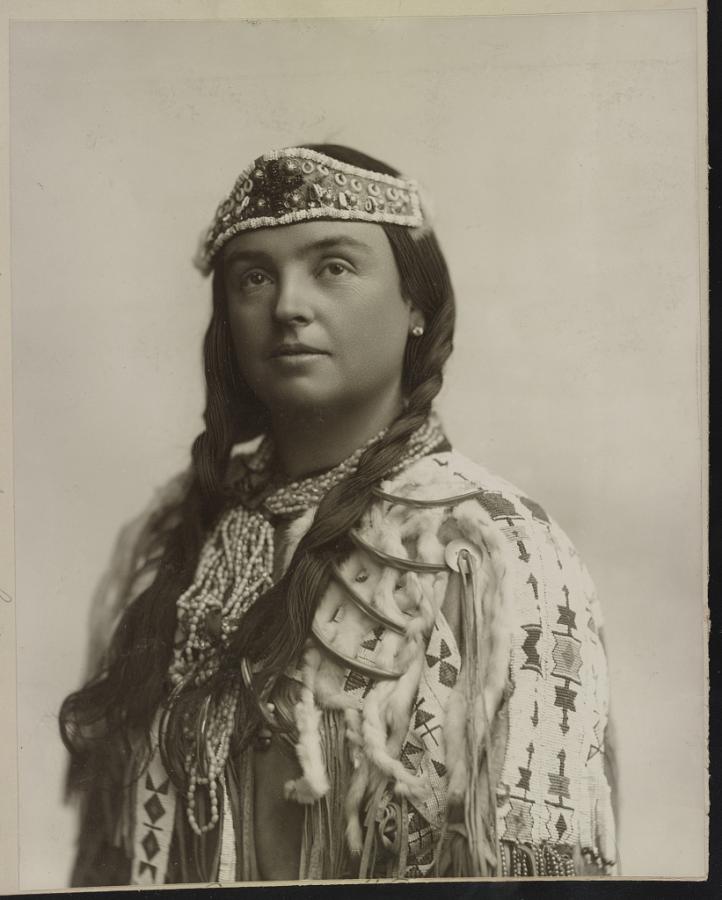Princess Wenonah

From the Libary of Congress collection
https://www.loc.gov/resource/ds.09250/
About this Item
Title
[Princess Winona from the Dakota Sioux legend "Lover's Leap"]
Summary
Photograph shows portrait of Native American woman dressed for her role as Princess Winona (or Wenonah) in "Lover's Leap" for Pawnee Bill's Wild West Show.
Contributor Names
Siegel, Cooper & Co., copyright claimant
Created / Published
[1905]
Subject Headings
- Pawnee Bill's Historical Wild West, Indian Museum, and Encampment--People--1900-1910
- Indians of North America--Performances & portrayals--1900-1910
- Dakota Indians--Performances & portrayals--1900-1910
- Entertainers--1900-1910
- Wild west shows--1900-1910
Headings
Photographic prints--1900-1910.
Portrait photographs--1900-1910.
Genre
Portrait photographs--1900-1910
Photographic prints--1900-1910
Notes
- H57017 U.S. Copyright Office.
- Title devised by Library staff.
Medium
1 photograph : gelatin silver print ; sheet 24 x 19 cm, mount 29 x 22 cm.
Call Number/Physical Location
LOT 12898 [item] [P&P]
Repository
Library of Congress Prints and Photographs Division Washington, D.C. 20540 USA http://hdl.loc.gov/loc.pnp/pp.print
Digital Id
ds 09250 //hdl.loc.gov/loc.pnp/ds.09250
Library of Congress Control Number
2016649551
Reproduction Number
LC-DIG-ds-09250 (digital file from original)
Rights Advisory
No known restrictions on publication.
Online Format
image
LCCN Permalink
https://lccn.loc.gov/2016649551
Additional Metadata Formats
MARCXML Record
MODS Record
Dublin Core Record
A poem by Henry Wadsworth Longfellow, "Hiawatha"
https://www.wikiwand.com/en/The_Song_of_Hiawatha
https://en.wikipedia.org/wiki/The_Song_of_Hiawatha
In Chapter III, in "unremembered ages", a woman named Nokomis falls from the Moon. Nokomis gives birth to Wenonah, who grows to be a beautiful young woman. Nokomis warns her not to be seduced by the West Wind (Mudjekeewis) but she does not heed her mother, becomes pregnant and bears Hiawatha.
In the ensuing chapters, Hiawatha has childhood adventures, falls in love with Minnehaha, slays the evil magician Pearl-Feather, invents written language, discovers corn and other episodes. Minnehaha dies in a severe winter.
The poem closes with the approach of a birch canoe to Hiawatha's village, containing "the Priest of Prayer, the Pale-face." Hiawatha welcomes him joyously; and the "Black-Robe chief" brings word of Jesus Christ and the Blessed Virgin. Hiawatha and the chiefs accept the Christian message. Hiawatha bids farewell to Nokomis, the warriors, and the young men, giving them this charge: "But my guests I leave behind me/ Listen to their words of wisdom,/ Listen to the truth they tell you." Having endorsed the conversion of the Ojibwe people to the Roman Catholic Church, Hiawatha, similarly to Väinämöinen at the end of the Kalevala, launches his canoe westward toward the sunset and departs forever.



